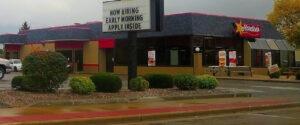
Courtesy Corey Coyle, CC 3.0 Unported
For a time, back in the Reagan-Bush era, I was a teen employee in a Hardee’s in coal country. By incompetence I had failed upward, away from the fry station and off the backline, to work the front counter, and then that most American techno-capitalist space, the drive-thru window. I was like a lone astronaut in his capsule, communicating through an intercom, far from managerial help, dealing with alien life forms every Friday night.
Running a register and bagging food was easier work than the other positions in the restaurant, and a lot less greasy and hot. There was a certain prestige to it. But one had to have the temperament to deal with the public. Clearly I had the right stuff.
“Incentives” to drive kid-business in the fast food industry had been around for a few years. McDonalds was giving away trinkets even before the advent of the Happy Meal in 1979. Hardee’s decided to up the stakes in 1982 by giving away Smurf drinking glasses. If you ate enough Big Cookies and Big Roast Beefs, you could collect a set of eight. A full set sat on the front counter, not even in a case, so customers could see them, finger them, steal them, accidentally knock them off and break them, and start arguments with cashiers about their actual value. They were worthless, made of cheap glass that broke into dangerous ragged shards and glass dust that imbedded in the skin.
I am tempted to say food/customer service was easier in that time and place, but that may not be so. Many “characters” came in the Hardee’s in that town. One troublemaker was an older guy, maybe 50, who verbally abused workers, especially females. He gaslighted when he got change. He found ways to alter his orders or demand other things for free once the order was complete. He got off on his bullying power.
The corporate policy of Hardee’s was business-politesse: that we be polite and tolerant. This put us in a bind, because the man could continue his ways, even escalate the unpleasantness and dilate his time-suck, but if we were snappish in return we could be fired. (The man was careful never to make it physical, exactly, not that the police would have done much if he had threatened violence.) Everyone was made anxious at his appearance, and many feared him. He was on the fringe on the societal/individual split and loved to throw everything out of balance. He knew there was an irreconcilable tension in business (“the customer is always right”), just as there is in liberal society. We want to show that we practice the openness we espouse, but it can get used against us.
Teens can be devilish anyway, and my friends and I were a specific brand. We had made plans, if the man assaulted anyone, to drag him over the counter and show him how we mopped the floor. Between my family’s fortunes and systemic aspects of region and nation, I was disappointed in my college ambitions, at least temporarily. I had given two weeks’ notice and was about to report to basic training.
The man came in with his wife and kid, brought them to my register, and started acting the fool. He insulted me, mocked me, laughed at my beginning to stumble in anger. The kicker was something having to do with those stupid Smurf glasses. I cannot remember the details now; I think he announced he was going to take the entire display set for his kid, and there was nothing I could do about it, and maybe he would kick my ass. I laughed meanly and told him that was it, to come out back, that I was going to bootstomp him flat in the alley for all we had suffered by him.
It remains one of the great surprises of my life that he changed, on the spot, completely. He not only did not try to take the cheap glasses, but for the next two weeks was respectful, admiring but not groveling, and filled with good humor toward me. We were pals. Bullies need management too.
